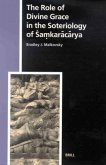The Hare Krishna movement is one of the most well-known new religious movements in the Western societies. It was founded in New York in 1966 by the Indian monk A. C. Bhaktivedanta Swami PrabhupAda (1896-1977). The fact that it emerged during the heyday of the countercultural protests is often invoked in the explanations of its success. This book offers a completely new account for the rise and growth of the Hare Krishna movement by analysing it from the viewpoint of cognitive science of religion. It focuses on the charisma of the founder-guru through the writings of his earliest disciples and also takes a close look at the theology and ritual practices of the movement.
Hinweis: Dieser Artikel kann nur an eine deutsche Lieferadresse ausgeliefert werden.
Hinweis: Dieser Artikel kann nur an eine deutsche Lieferadresse ausgeliefert werden.








